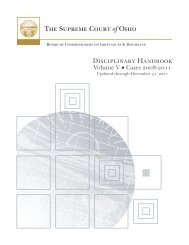The Joint Committee to Study Court Costs and ... - Supreme Court
The Joint Committee to Study Court Costs and ... - Supreme Court
The Joint Committee to Study Court Costs and ... - Supreme Court
You also want an ePaper? Increase the reach of your titles
YUMPU automatically turns print PDFs into web optimized ePapers that Google loves.
from case files. <strong>The</strong>se responsibilities create a need for increased funding for<br />
technology services in local courts.<br />
In addition <strong>to</strong> an increase in the fee, the Revised Code should be<br />
amended <strong>to</strong> lessen the tension between elected clerks of court <strong>and</strong> judges over<br />
control of the clerk of courts’ computerization fees. Although the Revised Code<br />
requires the fee <strong>to</strong> be used for computerization of the clerks’ offices, the judges<br />
control the expenditures. Clerks <strong>and</strong> judges should work <strong>to</strong>gether <strong>and</strong> coordinate<br />
their technology systems; however, clarity should be provided <strong>to</strong> allow the<br />
elected clerks control over those funds.<br />
4. <strong>The</strong>re should be an increase in certain probate fees.<br />
Probate fees are set by statute <strong>and</strong> in some cases have not increased in<br />
the last three decades. <strong>The</strong>se fees no longer are sufficient <strong>to</strong> meet the needs of<br />
Ohio’s probate courts. House Bill 564, sponsored by Representative Steble<strong>to</strong>n,<br />
was introduced in the 127 th General Assembly <strong>to</strong> increase probate fees <strong>to</strong> keep<br />
pace with inflation. <strong>The</strong> <strong>Joint</strong> <strong>Committee</strong> recommends the General Assembly act<br />
with all due speed in enacting this legislation.<br />
<strong>The</strong> <strong>Joint</strong> <strong>Committee</strong> also considered an alternative proposal <strong>to</strong><br />
recommend probate courts charge a percentage of certain probate cases <strong>and</strong><br />
trusts in lieu of increasing probate fees. Although the <strong>Joint</strong> <strong>Committee</strong> is not<br />
recommending such a plan be implemented, it does recommend that the Ohio<br />
Association of Probate Judges, the Ohio Judicial Conference <strong>and</strong> the <strong>Supreme</strong><br />
<strong>Court</strong> of Ohio further research this alternative funding mechanism.<br />
5. <strong>The</strong> General Assembly should amend current law <strong>to</strong> give trial courts<br />
the statu<strong>to</strong>ry authority <strong>to</strong> suspend the imposition or payment of<br />
costs after the court has imposed sentence.<br />
In State v. Clevenger, 114 Ohio St.3d 258, (2007), the <strong>Supreme</strong> <strong>Court</strong><br />
held that a trial court does not have authority <strong>to</strong> either suspend the imposition or<br />
payment of court costs after the court has imposed sentence, even when the<br />
offender is indigent. <strong>The</strong> <strong>Court</strong> found trial courts lack this ability because they are<br />
not specifically authorized by statute <strong>to</strong> waive costs after sentencing.<br />
This serves little practical purpose. Although section 2947.23 of the<br />
Revised Code allows for community service in lieu of payment of costs, many<br />
offenders become debilitated or have a change in circumstances after sentencing<br />
<strong>and</strong> cannot perform community service. This means indigent offenders do not<br />
pay their court costs <strong>and</strong> do not perform the community service. In order <strong>to</strong> rectify<br />
this problem, the General Assembly should amend the statute <strong>to</strong> allow the court<br />
the discretion <strong>to</strong> suspend costs after sentencing.<br />
6
















